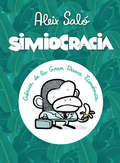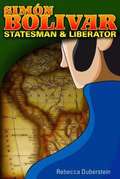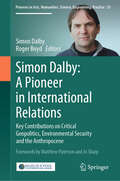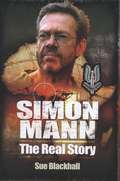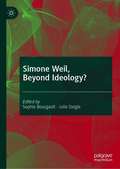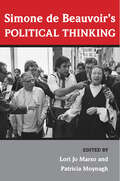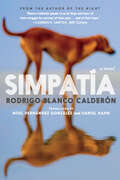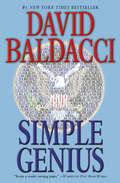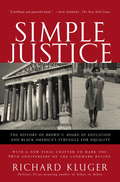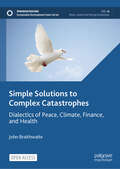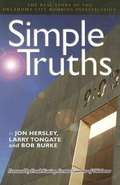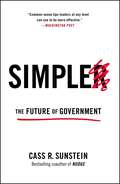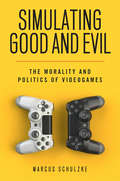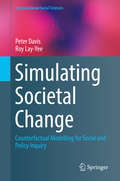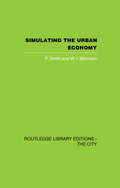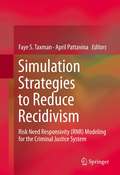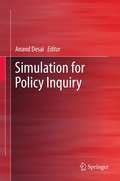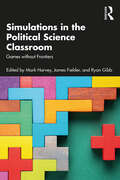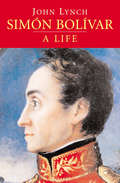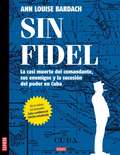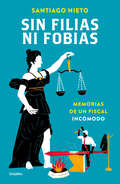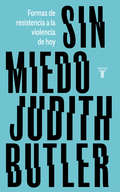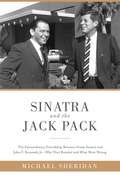- Table View
- List View
Simiocràcia (català)
by Aleix SalóLes causes de la crisi.Els antecedents de la crisi.Els efectes de la crisi.La corrupció irracional.La involució social.El govern disfuncional.Ha arribat la simiocràcia.Aleix Saló torna a la càrrega després dEspañistán. En el seu llibre nou i esperat texplica tota la veritat sense embuts i sense anar-sen per les branques. No podràs parar de sacsejar larbre.
Simon Bolivar: Statesman & Liberator
by Rebecca DubersteinThis book is a biography of Venezuelan soldier and statesman who led the revolutions against Spanish rule in the Viceroyalty of New Granada.
Simon Dalby: Key Contributions on Critical Geopolitics, Environmental Security and the Anthropocene (Pioneers in Arts, Humanities, Science, Engineering, Practice #35)
by Simon Dalby Roger BoydThis book profiles Simon Dalby’s academic contributions in the fields of critical geopolitics, environmental security and the intersection of international relations and the Anthropocene. It includes reprints of key essays that highlight innovations in critical thought at the intersections between geopolitics, environment and security. Starting with an analysis of American reconstructions of the Soviet threat in the 1970s, an early contribution to the emerging field of critical geopolitics, subsequent papers focus on the emergent formulations of environmental security in the aftermath of the Cold War and the environmental costs of globalization. Focusing on the implicit geographical framing in discourses of globalization offered a critique that extended the ambit of critical geopolitics to grapple with the issues of environmental security and the rising concern with climate change as well as the political identities invoked in that debate. In the aftermath of 9/11, similar arguments about contextualization applied to the American global war on terror and the revival of discussions of empire and its geographies, both in arguments for invading Iraq, as well as the wider discussions in policy discourse and popular culture. Simultaneously, the emergence of earth system science and the concept of the Anthropocene offered another way to highlight the dangers of fossil fueled economic activities. The necessity of fundamentally rethinking the premises of security policy in light of this recontextualization is emphasized in more recent contributions on climate security and the current ecological crisis. Critical geopolitics Environmental security Global war on terror Firepower in the Anthropocene
Simon Mann: The Real Story
by Sue Blackhall<p>It had all the ingredients of a best-selling thriller – the clandestine activities of mercenaries, an impossibly dare-devil plot to topple the regime of one of the world’s most corrupt countries; the ‘boy’s own’ approach by arrogant old public school pupils and the controversy and intrigue from within governmental departments. Add in high-profile figures embroiled in the plot and the far-reaching repercussions and you have what was to become one of the most talked-about exploits of the twenty-first century. <p>In retrospect, the attempted coup on the tiny African country of Equatorial Guinea was always destined to fail. Even the coup’s leader, Simon Mann was forced to admit it. <p>This story is about those who dared to involve themselves in change of a country which did not want to be changed; which did not want to find itself the focus of global interest.<p>
Simone Weil, Beyond Ideology?
by Sophie Bourgault Julie DaigleIn the last decade, interest in the writings of French philosopher Simone Weil (1909-1943) has surged. Weil is admired for her militant syndicalism, her factory experience and participation in the French resistance, but it is above all the eclectic and rich character of her work that has increasingly attracted scholarly attention. Weil reflected on subjects as diverse as quantum physics, Greek tragedy, bankruptcy, colonialism, technology, education, and religious metaphysics, but perhaps most interesting is the way that her work seems to defy any clear ideological labelling: Marxist, anarchist, liberal, conservative and republican all seem to fall short in describing the complexity of Weil’s thinking. Adding to the interpretive difficulty is the fact that Weil often expressed biting criticisms of most things political. What this edited volume argues is that it is precisely Weil’s unclassifiable nature, combined with her sharp and sometimes ambivalent criticisms of politics, that make her work a most timely and fascinating object of study for contemporary political philosophy. It proposes a two-pronged approach to her thought: first, via a series of conversations set up between Weil and key authors in modern and contemporary political theory (e.g. Sandel, Rawls, Ahmed, Agamben, Orwell); and secondly, via a close study of Weil’s reflections on various ideologies. The goal of this book is not to position Simone Weil squarely within a single ideological tradition but rather to propose that her thought might allow us to critically engage with various ideologies in the history of political ideas.
Simone de Beauvoir’s Political Thinking
by Mary Caputi Karen Shelby Lori Marso Emily Zakin Sonia Kruks Patricia MoynaghBy exploring the life and work of the influential feminist thinker Simone de Beauvoir, this book shows how each of us lives within political and social structures that we can--and must--play a part in transforming. It argues that Beauvoir’s careful examination of her own existence can also be understood as a dynamic method for political thinking. As the contributors illustrate, Beauvoir's political thinking proceeds from the bottom up, using examples from individual lives as the basis for understanding and transforming our collective existence. For example, she embraced her responsibility as a French citizen as making her complicit in the French war against Algeria. Here, she sees her role as an oppressor. In other contexts, she looks to the lives of individual women, including herself, to understand the dimensions of gender inequality. This volume’s six tightly connected essays home in on the individual’s relationship to community, and how one’s freedom interacts with the freedom of other people. Here, Beauvoir is read as neither a liberal nor a communitarian. The authors focus on her call for individuals to realize their freedom while remaining consistent with ethical obligations to the community. Beauvoir's account of her own life and the lives of others is interpreted as a method to understand individuals in relations to others, and as within structures of personal, material, and political oppression. Beauvoir's political thinking makes it clear that we cannot avoid political action. To do nothing in the face of oppression denies freedom to everyone, including oneself.
Simpatía: A Novel
by Rodrigo Blanco CalderónLONGLISTED FOR THE 2024 INTERNATIONAL BOOKER PRIZERodrigo Blanco Calderón has established himself as one of the great voices of Latin American literature with his debut novel The Night, and his short story collection Sacrifices. Simpatía is a suspenseful novel with unexpected twists and turns about the agony of Venezuela and the collapse of Chavismo.Simpatía is set in the Venezuela of Nicolas Maduro amid a mass exodus of the intellectual class who have been leaving their pets behind. Ulises Kan, the protagonist and a movie buff, receives a text message from his wife, Paulina, saying she is leaving the country (and him). Ulises is not heartbroken but liberated by Paulina's departure. Two other events end up disrupting his life even further: the return of Nadine, an unrequited love from the past, and the death of his father-in-law, General Martín Ayala. Thanks to Ayala&’s will, Ulises discovers that he has been entrusted with a mission—to transform Los Argonautas, the great family home, into a shelter for abandoned dogs. If he manages to do it in time, he will inherit the luxurious apartment that he had shared with Paulina.This novel centers on themes of family and orphanhood in order to address the abuse of power by a patrilineage of political figures in Latin America, from Simón Bolívar to Hugo Chávez. The untranslatable title, Simpatía, which means both sympathy and charm, ironically references the qualities these political figures share. In a morally bankrupt society, where all human ties seem to have dissolved, Ulises is like a stray dog picking up scraps of sympathy. Can you really know who you love? What is, in essence, a family? Are abandoned dogs proof of the existence or non-existence of God? Ulises unknowingly embodies these questions, as a pilgrim of affection in a post-love era.
Simple Genius (King & Maxwell Series #3)
by David BaldacciTwo ex-Secret Service agents must face a dark world of violence, codes, and spies at a secret CIA training camp in this #1 New York Times bestseller about a mystery that could destroy the nation.Near Washington, D.C., there are two clandestine institutions: the world's most unusual laboratory and a secret CIA training camp. Drawn to these sites by a murder, ex-Secret Service agent Sean King encounters a dark world of mathematicians, codes, and spies. His search for answers soon leads him to more shocking violence-and an autistic girl with an extraordinary genius.Now, only by working with his partner, Michelle Maxwell, who is battling her own personal demons, can he catch a killer...and stop a national threat.
Simple Justice: The History of Brown v. Board of Education and Black America's Struggle for Equality
by Richard KlugerSimple Justice is the definitive history of the landmark case Brown v. Board of Education and the epic struggle for racial equality in this country. Combining intensive research with original interviews with surviving participants, Richard Kluger provides the fullest possible view of the human and legal drama in the years before 1954, the cumulative assaults on the white power structure that defended segregation, and the step-by-step establishment of a team of inspired black lawyers that could successfully challenge the law. Now, on the fiftieth anniversary of the unanimous Supreme Court decision that ended legal segregation, Kluger has updated his work with a new final chapter covering events and issues that have arisen since the book was first published, including developments in civil rights and recent cases involving affirmative action, which rose directly out of Brown v. Board of Education.From the Trade Paperback edition.
Simple Models to Explore Deterrence and More General Influence in the War with al-Qaeda
by Paul K. DavisDeterring terrorism is best approached as part of a broad effort to influence all elements of a terrorist system, and simple, conceptual models of decisionmaking can help in understanding how to affect others' behavior. The paper lays out a theory of how to use influence to affect elements of a terrorist system, touching on root causes, individual motivation, public support, and likely factors in the decisionmaking of terrorist organizations.
Simple Solutions to Complex Catastrophes: Dialectics of Peace, Climate, Finance, and Health (Sustainable Development Goals Series)
by John BraithwaiteThis open access book sets out simple solutions to managing complex catastrophes. It focusses on four kinds of crises – climate change, crime-war cascades, epidemics and financial crises. These catastrophes are conceived as complex and prone to cascade effects. This book is optimistic in explaining that there are identifiable simple institutions that international society can strengthen and some simple principles that can help humankind to control the expanding gamut of complex catastrophes that confront the planet including simple, stable institutions and regulatory bodies. It draws on a wide range of current and past crises and challenges, from the Cold War to COVID-19, and from Weapons of Mass Destruction to restorative diplomacy with States like China, to provide an urgent and timely path forward. It speaks to those interested in criminology, public policy and international relations, political science, sociology, public health and economics.
Simple Truths: The Real Story of the Oklahoma Bombing Investigation
by Jon Hersley Larry Tongate Bob BurkeThe world was stunned on April 19, 1995, by the bombing of the Alfred P. Murrah Federal Building in Oklahoma City that killed 168 men, women, and children. In the aftermath of this horrific act, Americans did not want to believe that two clean-shaven, short-haired former army veterans could plan and carry out the most violent act of domestic terrorism in United States history. This book gives detailed explanations of the FBI's investigation.
Simpler
by Cass R. SunsteinSimpler government arrived four years ago. It helped put money in your pocket. It saved hours of your time. It improved your children's diet, lengthened your life span, and benefited businesses large and small. It did so by issuing fewer regulations, by insisting on smarter regulations, and by eliminating or improving old regulations. Cass R. Sunstein, as administrator of the most powerful White House office you've never heard of, oversaw it and explains how it works, why government will never be the same again (thank goodness), and what must happen in the future. Cutting-edge research in behavioral economics has influenced business and politics. Long at the forefront of that research, Sunstein, for three years President Obama's "regulatory czar" heading the White House Office of Information and Regulatory Affairs, oversaw a far-reaching restructuring of America's regulatory state. In this highly anticipated book, Sunstein pulls back the curtain to show what was done, why Americans are better off as a result, and what the future has in store. The evidence is all around you, and more is coming soon. Simplified mortgages and student loan applications. Scorecards for colleges and universities. Improved labeling of food and energy-efficient appliances and cars. Calories printed on chain restaurant menus. Healthier food in public schools. Backed by historic executive orders ensuring transparency and accountability, simpler government can be found in new initiatives that save money and time, improve health, and lengthen lives. Simpler: The Future of Government will transform what you think government can and should accomplish.
Simulating Good and Evil: The Morality and Politics of Videogames
by Marcus SchulzkeSimulating Good and Evil shows that the moral panic surrounding violent videogames is deeply misguided, and often politically motivated, but that games are nevertheless morally important. Simulated actions are morally defensible because they take place outside the real world and do not inflict real harms. Decades of research purporting to show that videogames are immoral has failed to produce convincing evidence of this. However, games are morally important because they simulate decisions that would have moral weight if they were set in the real world. Videogames should be seen as spaces in which players may experiment with moral reasoning strategies without taking any actions that would themselves be subject to moral evaluation. Some videogame content may be upsetting or offensive, but mere offense does not necessarily indicate a moral problem. Upsetting content is best understood by applying existing theories for evaluating political ideologies and offensive speech.
Simulating Societal Change: Counterfactual Modelling for Social and Policy Inquiry (Computational Social Sciences)
by Peter Davis Roy Lay-YeeThis book presents a method for creating a working model of society, using data systems and simulation techniques, that can be used for testing propositions of scientific and policy nature. The model is based on the example of New Zealand, but will be applicable to other countries. It is expected that collaborators in other countries can emulate this example with their data systems for teaching and policy purposes, producing a cross-national "collaboratory". This enterprise will evolve with, and to a degree independently of, the book itself, with a supporting website as well as teaching and scientific initiatives. Readers of this text will, for the first time, have a simulation-based working model of society that can be interrogated for policy and substantive purposes. This book will appeal to researchers and professionals from various disciplines working within the social sciences, particularly on matters of demography and public policy.
Simulating the Urban Economy: Experiments with input-output techniques
by P. Smith W. I. MorrisonThis book was first published in it's current form in 1974.
Simulation Strategies to Reduce Recidivism
by Faye S. Taxman April PattavinaThe use of simulation modeling in criminal justice dates back to the 1970s. Early models were developed to capture the realities of the criminal justice system, to identify what changes were needed, and how small changes would affect the overall picture. Significant time and effort were devoted to these projects and although they achieved some success, the complex nature of the criminal justice system and the difficulties associated with improving and maintaining the models prohibited wide spread adoption in the field. Some of the problems with early simulation projects were the lack of data to validate models, the lack of technical skills needed by staff to design and build the models, and the technical difficulties with software programming to transform models into computerized representations. As simulation modeling has becoming a more popular technique across many disciplines, and technology as well as the technical skills of researchers has improved, this book revisits the concept of simulation modeling with new applications for the criminal justice system. The wider availability of data has made for more opportunity to verify and validate models; computing software has become more available and easier to use; and the capacity for visualization and communication of models shows promise for the future of simulation in criminal justice. The time has come to examine the past, present, and future contributions of simulation modeling to the field of criminal justice. This work provides a central resource of information for the current state of simulation modeling, and overview of existing techniques and cases of success, and directions for future development. This work will be an important resource for researchers in criminal justice and related fields, as well as those studying policy-related topics.
Simulation for Policy Inquiry
by Anand DesaiPublic policy and management problems have been described as poorly defined, messy, squishy, unstructured, intractable, and wicked. In a word, they are complex. This book illustrates the development and use of simulation models designed to capture some of the complexity inherent in the formulation, management, and implementation of policies aimed at addressing such problems. Simulation models have long existed at the fringes of policy inquiry but are not yet considered an essential component of the policy analyst's toolkit. However, this situation is likely to change because with improvements in computational power and software, simulation is now easier to include in the standard repertoire of research tools available for discovery and decision support. This volume provides both a conceptual rationale for using simulations to inform public policy and a practical introduction to how such models might be constructed and employed. The focus of these papers is on the uses of simulation to gain understanding and inform policy decisions and action. Techniques represented in this volume include Monte Carlo simulation, system dynamics and agent based modeling.
Simulations in the Political Science Classroom: Games without Frontiers
by Mark HarveyThis book is premised on the assumption that games and simulations provide welcome alternatives and supplements to traditional lectures and class discussions—especially in political science classrooms, where real-world circumstances provide ideal applications of theory and policy prescriptions. Implementing such an active learning program, however, is sometimes daunting to overburdened professors and teaching assistants. This book addresses the challenges of using games and simulations in the political science classroom, both online and in person. Each chapter offers a game or simulation that politics teachers can use to teach course concepts and explains ways to execute it effectively. In addition, the authors in this volume make a proactive case for games and simulations. Each chapter offers research to evaluate the effectiveness of the activity and pedagogical design best practices. Thus, the book not only serves as a game design resource, but also offers demonstrable support for using games and simulations in the political science classroom. Aimed at teachers at all levels, from high school through college, the book may be especially appealing to graduate students entering teaching for the first time and open to new teaching and learning approaches.
Simulations in the Political Science Classroom: Games without Frontiers
by Mark HarveyThis book is premised on the assumption that games and simulations provide welcome alternatives and supplements to traditional lectures and class discussions—especially in political science classrooms, where real-world circumstances provide ideal applications of theory and policy prescriptions. Implementing such an active learning program, however, is sometimes daunting to overburdened professors and teaching assistants. This book addresses the challenges of using games and simulations in the political science classroom, both online and in person. Each chapter offers a game or simulation that politics teachers can use to teach course concepts and explains ways to execute it effectively. In addition, the authors in this volume make a proactive case for games and simulations. Each chapter offers research to evaluate the effectiveness of the activity and pedagogical design best practices. Thus, the book not only serves as a game design resource, but also offers demonstrable support for using games and simulations in the political science classroom. Aimed at teachers at all levels, from high school through college, the book may be especially appealing to graduate students entering teaching for the first time and open to new teaching and learning approaches.
Simón Bolívar: A Life
by John LynchThe &“impeccably researched, uncommonly honest, and . . . very well written&” biography of the nineteenth century Venezuelan military and political leader (Alvaro Vargas Llosa, New Republic). Simón Bolívar was a revolutionary who freed six South American countries from Spanish Imperial rule, an intellectual who argued the principles of national liberation, and a statesman who led the governments of Venezuela, Gran Colombia, Bolivia, and Peru. His life, passions, and battles were woven into Spanish American culture almost as soon as they happened. In the first major English-language biography of &“The Liberator&” in half a century, John Lynch draws on extensive research to understand Bolívar&’s life in the context of his own society and times, and to explore his remarkable and enduring legacy. Simón Bolívar illuminates the man&’s inner world, the dynamics of his leadership, his power to command, and his modes of ruling the diverse peoples of Spanish America. The key to his greatness, Lynch concludes, was his ability to inspire people to follow him beyond their immediate interests, in some cases through years of unremitting struggle. Encompassing Bolívar&’s entire life and his many accomplishments, this is the definitive account of a towering figure in the history of the Western hemisphere. &“[A] masterly new biography.&” —Noam Lupu, San Francisco Chronicle
Sin Fidel: Los Ultimos Anos De Fidel Castro, Sus Enemigos Y El Futura De Cuba (Vintage Espanol Ser.)
by Ann Louise BardachEste libro explora cuáles serán las consecuencias después de la muerte de Fidel Castro, una de las figuras más emblemáticas de Latinoamérica. Sin Fidel es un recuento fascinante y esclarecedor sobre el último capítulo de la vida de Fidel Castro. Un libro que explora cuáles serán las consecuencias después de su muerte, sus enemigos y su estéril guerra de más de cincuenta años para derrocarlo, así como la sucesión meticulosamente planeada y el temprano reinado de su hermano Raúl. En este libro, la autora ofrece una crónica deslumbrante sobre la confrontación política entre Washington y La Habana, a partir de casi dos décadas de ejercer el periodismo a profundidad y de incontables entrevistas con los protagonistas, donde figuran tanto el comandante mismo, su hermano Raúl y otros miembros dela familia, como cubanos de a pie y oficiales y políticos en Miami, La Habana y Washington. El resultado es un doble retrato inolvidable de Fidel y Raúl Castro: sin lugar a dudas la mancuerna política más exitosa y duradera de la historia. La autora nos regala una radiografía sin parangón sobre uno de los gobernantes más controvertidos, combativos y carismáticos de la historia. Sin Fidel incluye material inédito sobre Castro, su familia y su medio siglo de dictadura en el país más grande del Caribe, a la vez que nos concientiza sobre la forma en que su adiós definitivo transformará para siempre el escenario político y social no sólo del hemisferio occidental sino del mundo entero.
Sin filias ni fobias: Memorias de un fiscal incómodo
by Santiago NietoLa historia más indignante que pueda imaginarse: un fiscal vapuleado por hacer su trabajo. En 2015, Santiago Nieto recibió un encargo claro: investigar los delitos electorales. Pero cuando lo hizo a profundidad, la maquinaria gubernamental lo embistió brutalmente. En este documento histórico, el extitular de la Fiscalía Especializada para la Atención de Delitos Electorales explica, con todo detalle, quiénes se incomodaron con su labor, por qué lo acosaron y los casos que desataron la persecución: Odebrecht, Estado de México, Veracruz, Chiapas... En Sin filias ni fobias, Santiago Nieto evidencia la lógica y la podredumbre que, hasta ahora, ha campeado en buena parte de las instituciones mexicanas... y que ahora a él le toca combatir.
Sin miedo: Formas de resistencia a la violencia de hoy
by Judith Butler«La violencia que vemos es una reacción frente a los progresos que hemos hecho, y eso significa que debemos seguir avanzando y aceptar que se trata de una lucha continuada, una lucha en la que los principios están de nuestro lado.» Judith Butler, una de las filósofas más reconocidas del mundo por sus contribuciones al feminismo, a la defensa de los derechos humanos y al pensamiento político, rastrea, en este nuevo libro, las formas de resistencia a las múltiples modalidades de violencia -desde la tortura por razones políticas, los crímenes contra mujeres, hasta la decisión de negar los horrores del pasado, el desprecio contra los migrantes o la desigualdad global- que caracteriza a nuestras sociedades contemporáneas. Sin miedo recoge una serie de conferencias recientes de la autora sobre justicia, memoria, duelo, crítica y disidencia, en las que formula, además de sus inestimables reflexiones filosóficas, un conjunto de herramientas conceptuales con las que repensar la resistencia ante cualquier forma de opresión. Judith Butler, autora de reconocidos ensayos de pensamiento político como Marcos de guerra, Dar cuenta de sí mismo y Vida precaria, vuelve en este nuevo libro a pensar y repensar en las formas de resistencia a las múltiples modalidades de violencia. A partir de sus más recientes conferencias, Contra la violencia es un conjunto de reflexiones sobre justicia, memoria, duelo y lamento, crítica y disenso que ofrece, además de sus inestimables reflexiones filosóficas, un conjunto de herramientas conceptuales con las cuales resignificar la resistencia a toda forma de subyugación.
Sinatra and the Jack Pack: The Extraordinary Friendship between Frank Sinatra and John F. Kennedy Jr. - Why They Bonded and What Went Wrong
by David Harvey Michael SheridanNew York Times bestseller: Frank Sinatra and JFK—the truth behind their friendship, and what destroyed it. Frank Sinatra had his Rat Pack, made up of hard-drinking, womanizing charmers like himself, Dean Martin, Sammy Davis, Jr., and Peter Lawford. But the guy Ol’ Blue Eyes wanted to hang with was Lawford’s brother-in-law, the real chairman of the board, John F. Kennedy. In Sinatra and the Jack Pack, Michael Sheridan delves deep into the acclaimed singer’s relationship with the former president. He shares how Sinatra emerged from a working class Italian family and carved out a unique place for himself in American culture, and how Kennedy, also of immigrant stock, came from a privileged background of which the young Frank could only have dreamed. By the time the men met in the 1950s, both were successful—and both liked the good life. They bonded over their mutual ability to attract beautiful women, male admirers, and adoring acolytes. They also shared a scandalous secret: each had dubious relationships with the mafia. It helped Frank’s career and bought Kennedy votes. All the while, FBI Director J. Edgar Hoover was compiling detailed and damning dossiers on their activities. From all accounts the friendship thrived. Then, suddenly, in March 1962, Frank was abruptly ejected from JFK’s gang. Sinatra and the Jack Pack, the basis for a Reelz Channel documentary, reveals why. With its legendary cast of characters, this is the compelling, untold story of a tumultuous relationship between two American icons.
